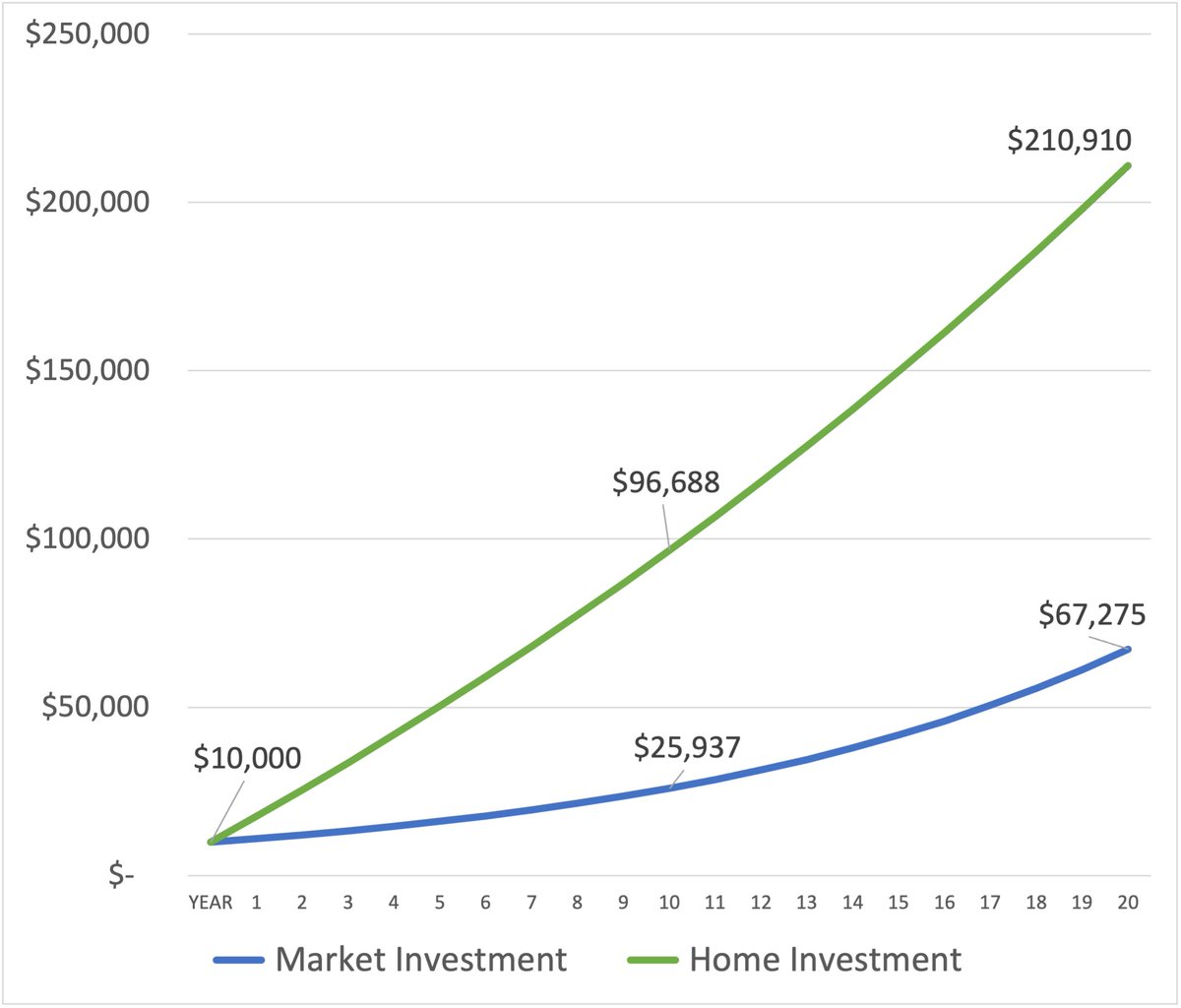
🧮 Renting vs. Owning: The Math
Home ownership continues to be the single most misunderstood topic in personal finance.
It’s the best investment available to regular Americans yet… 🧵
Home ownership continues to be the single most misunderstood topic in personal finance.
It’s the best investment available to regular Americans yet… 🧵
...there are still people out there advising against it under the misguided belief that renting plus investing the same money in the market is a smarter play.
It’s time to revisit the math…
It’s time to revisit the math…
The reason home ownership is such a great investment is *leverage*, which unfortunately is a concept most people don’t understand. I tried to explain leverage in a previous thread (below), but let’s face it—financial stuff is confusing for most people.
https://twitter.com/Camp4/status/1339689324242071552?s=20
Just know that home ownership is unique in a few ways:
1⃣Unless you live in your parents’ basement you’ll have a monthly housing expense whether you rent or own.
2⃣The housing system is rigged in your favor. You have access to cheap debt, tax advantages, and more.
1⃣Unless you live in your parents’ basement you’ll have a monthly housing expense whether you rent or own.
2⃣The housing system is rigged in your favor. You have access to cheap debt, tax advantages, and more.
3⃣Historically homes have been one of the safest & most predictable investments, through multiple recessions and even a cataclysmic financial crisis (see the other thread I linked to above for data on this).
Last thing before we dive into the math:
There are exceptions to every rule, but those exceptions don’t disprove the rule. Home ownership may not make sense if...
❌You’re not planning to stay in the home at least 5 years and ideally 10
There are exceptions to every rule, but those exceptions don’t disprove the rule. Home ownership may not make sense if...
❌You’re not planning to stay in the home at least 5 years and ideally 10
❌You live in an area that is not growing OR you live in a unique market like NYC
❌You don't qualify for a mortgage
Now let’s do a side-by-side comparison of renting vs. owing as an investment...
❌You don't qualify for a mortgage
Now let’s do a side-by-side comparison of renting vs. owing as an investment...
The first thing to understand is that whether you rent or own (via a mortgage) you’re making a monthly payment.
When you rent you’re paying the owner’s mortgage, taxes, and maintenance. Remember, for an owner the whole point of renting their place is to make a profit!
When you rent you’re paying the owner’s mortgage, taxes, and maintenance. Remember, for an owner the whole point of renting their place is to make a profit!
So a monthly rent payment will almost always be higher than the cost to own the same place. But for sake of this analysis, let’s assume the monthly cost of renting & owning are the same.
The point here is that your monthly housing expense is a wash and whether you rent or own you can’t invest those dollars elsewhere. It doesn't factor into the investment math.
Surprisingly some people struggle with this basic assumption & think owners rent at a loss 🤷♂️
Surprisingly some people struggle with this basic assumption & think owners rent at a loss 🤷♂️
While there are examples of this, they are the exception not the rule. If you’re not with me on this you should stop reading this thread because I can’t help you.
If you’re OK with this assumption then it simplifies the comparison:
Put a chunk of 💵 into a down payment on a 🏠
vs.
Putting that same money into the market.
To make it tangible, we’ll look at:
$10k invested as a downpayment on a 🏠
vs.
$10k invested in the market
Put a chunk of 💵 into a down payment on a 🏠
vs.
Putting that same money into the market.
To make it tangible, we’ll look at:
$10k invested as a downpayment on a 🏠
vs.
$10k invested in the market
Which of these generates the greatest return? Well, here’s the punchline 📈👇
These numbers may seem 👁-popping, but it demonstrates the power of leverage in a system that is set up to help you succeed.
Let’s talk about the assumptions in this model. It assumes...
These numbers may seem 👁-popping, but it demonstrates the power of leverage in a system that is set up to help you succeed.
Let’s talk about the assumptions in this model. It assumes...

📈A 10% market return (on the upper end of the historical S&P average)
🏠2% annual home appreciation (below the historical average, esp for growth areas)
🏦A 30 year fixed mortgage at 3.5%
🤏I’ve ignored a few small factors that don’t affect the numbers in a meaningful way
🏠2% annual home appreciation (below the historical average, esp for growth areas)
🏦A 30 year fixed mortgage at 3.5%
🤏I’ve ignored a few small factors that don’t affect the numbers in a meaningful way
Here’s the Google Sheet if you want to check my math, play with the assumptions, or add more details.
Use this to decide for yourself but the comparison isn’t even close.
A skeptic could make a couple of arguments here...
docs.google.com/spreadsheets/d…
Use this to decide for yourself but the comparison isn’t even close.
A skeptic could make a couple of arguments here...
docs.google.com/spreadsheets/d…
1⃣That you could also lever your investment in the market. This is a horrible idea—non-pro investors should only use leverage on hard assets that are highly unlikely to depreciate. You won't find a better risk-adjusted investment than your own home.
2⃣You could find a cheap place to rent and invest the savings. This is a valid strategy but now it’s not an 🍎-to-🍎 comparison. Whether or not this makes sense would depend on the specifics.
I won't even get into the advanced tactics available to homeowners such as harvesting home equity & deploying to the market as arbitrage. I also didn't factor in tax advantages or the huge psychological benefit of a "forced savings" vehicle.
📚Case closed.
📚Case closed.
PS. It's worth noting that even if you assume 0% appreciation for the home it's still a better investment because an ever-growing chunk of your monthly housing expense goes toward YOUR equity instead of your landlord's.
• • •
Missing some Tweet in this thread? You can try to
force a refresh






